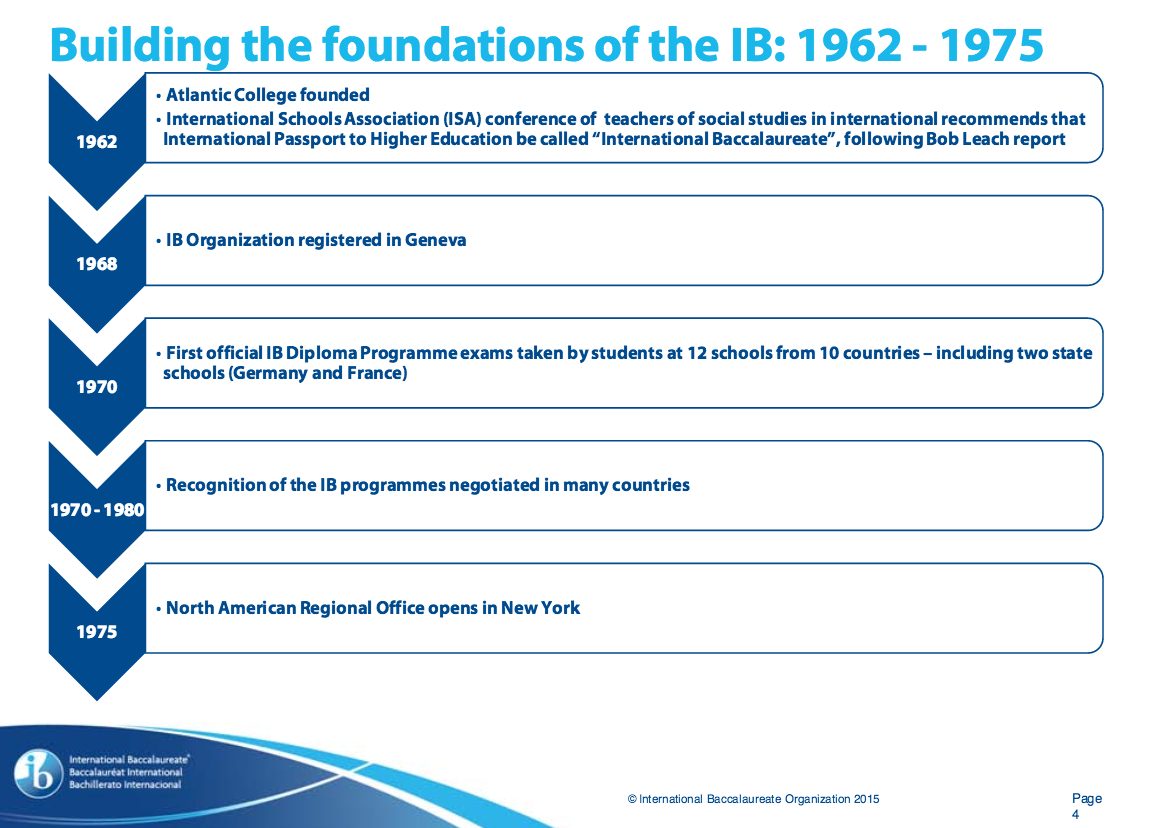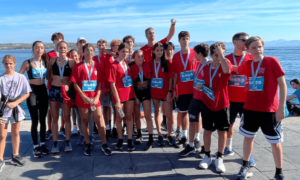(Editor’s note: This explainer post on the International Baccalaureate program was part of the launch of our beta site. It’s reposted here with updated information.)
Here’s a common scenario among our expat friends.
Their children are deep into their American-style curricula in middle school or high school and bang … the family is off to Europe after mom or dad gets a new assignment.
Needless to say, a lot is about to change, but many don’t realize one of the most dramatic differences will be in the education department. It’s most likely the kids will end up in international schools unless they’re native speakers of Dutch, French, German or whatever the language might be at their final destination.
If they’re on their way to an international school, they’re most likely going to be leaving behind the rote learning and memorization of an American-style education, including Advanced Placement, for the conceptual world of International Baccalaureate programs. As a matter of fact, we’re right in the middle of that transition with our 16-year-old daughter Lale, so here’s what we’ve learned so far.
IB is the dominant educational philosophy when it comes to international schools, whether you’re talking about the Netherlands, Berlin or Rome. Dispatches Europe’s headquarters is in the Netherlands, so Dispatches contributor Cameron Aubernon posted an overview of schools in Amsterdam. All the international schools she included have an IB curriculum. Interestingly, the International School of Amsterdam is the first school in the world to offer a complete International Baccalaureate curriculum, from three years of age, all the way to graduation.
So, what is IB? Here’s everything you need to know as a parent before you go meet with school faculty. (For more information, see this post for the detailed observations of a parent and student who went through an IB program in England.)
• Intellectually, International Baccalaureate is a philosophy of blending critical reflection about the entire scope of knowledge with a course of study. That course of study is a system of education that dates back to 1962. The concept was “created” in Switzerland by four influential international educators including American social studies teacher Robert Leach.
Yes, the idea is to give students a rigorous education. But International Baccalaureate means far more than that. The educators who created IB and who’ve tweaked the program since want to change the world by making students not just smarter, but also more analytical, more self-reliant, more internationally focused and more empathetic. In short, IB is more about teaching students to think independently, to organize and manage their time rather than memorize, and is meant to get them ready for the real world.
(You can see the Geneva-based IB organization’s website here.)
 Here’s the IB mission statement:
Here’s the IB mission statement:
The International Baccalaureate aims to develop inquiring, knowledgeable and caring young people who help to create a better and more peaceful world through intercultural understanding and respect. To this end the organization works with schools, governments and international organizations to develop challenging programmes of international education and rigorous assessment. These programmes encourage students across the world to become active, compassionate and lifelong learners who understand that other people, with their differences, can also be right.
• Though IB programs originally was only offered the last two years of what Americans call “high school,” there are now IB curricula for high school, middle school and what we call “elementary school,” and what Europeans call primary school. Kids in high school will likely go through the IB diploma program, a two-year curriculum for students 16 years old to 19 years old. For them, the three required educational components are the Theory of Knowledge course, the extended essay and completion of their creativity, activity, service, or CAS, hours. CAS hours basically are what Americans term “community service.”
• At different times of their careers, students are involved in different pursuits. Our daughter Lale currently attends International School Eindhoven, where she will be required to participate in extracurricular school and community efforts. She has to take six courses – three standard level, three higher level. In addition to her normal workload, she has to take Theory of Knowledge, Creativity, Activity and Service and will ultimately write an extended essay.
• Theory of Knowledge is a key element of the IB philosophy. It’s comparable to defending your thesis in graduate school. Teachers assess a student’s TOK through an end-of-the-school-year oral presentation and a 1,600 word essay. TOK “asks students to reflect on the nature of knowledge, and on how we know what we claim to know,” according to our briefings at ISE. The most central of these is “How do we know?” according to the IB website, which has as much information as you have time to read. Other aspects include defining what is evidence, how we judge models and what theory means in the real world.
• An extended 4,000-word essay as part independent, self-directed research in a topic of interest within a chosen subject. Teachers support the student throughout the process with advice and guidance.
• All IB programs teach the same core content everywhere in the world. Topics include math, science, history, world languages including French, Germany, Dutch, Japanese and Spanish, and Theory of Knowledge.
• This is interesting … assessments of students’ work are done internally by teachers, but also externally by officials at the IB Program regional headquarters, in our case Cardiff, Wales, according to our ISE briefing.
• Schools have to apply to become an IB school and meet certain standards. So in theory, they’re well vetted before your kid arrives. As of 1 February, there are 5,578 programs being offered worldwide at 4,335 schools worldwide, according to IBO.org.
• Unlike conventional curriculum, get ready to pay steep fees for registration and testing. Yes, students have to PAY to take IB tests, as much as 800 euros for the final IB diploma program exam at the international schools in the Netherlands! Seventy-five percent of the final grade is the IP course exam grade, while the rest is the class grade. Grades range from 1 through 7.
While all this sounds like a heavy load for a high school student, you can relax a bit. The Diploma Years Program is a cumulative course of study over two years. Lale will take the six courses, do the TOK essay, the Extended Essay and do her CAS work, but will have two years to get it all done.
IB should not be confused with Advanced Placement courses in the United States. The key difference is, AP programs revolve around “what,” while IB focuses on “why.” If your student is coming out of an AP program, there are few similarities. AP is an American program of offering high school students an unrelated group of college-level courses that include college credit hours upon completion.
Our daughters Lucy and Lale took AP European History and AP Human Geography at their American schools. Both AP classes were non-stop marathons of rote work that consumed way too much time.
By the end of the AP program, Lale didn’t retain enough of the information to get a score sufficient to earn the college credits. Lucy was overwhelmed because she also enrolled in a demanding performing arts school. Was it her failure? Partly, because Lucy is not a great test taker. But our conclusion as parents is AP takes up way too much time just to get a few college credits out of the way.
That said, the IB introductory meeting we attended made clear that if a student is coming out of an AP program and entering an IP program, they should be more than prepared. Also, like AP, following the IB curriculum requires more effort out of students than conventional classes in American public schools … at least three hours of homework each night.
So, the question you’re likely asking is, “If my kid goes through an IB program at an international school in Europe, will he or she be prepared to enter a selective university in the U.S.?”
We were just assured by ISE staff last week that the answer is a resounding “yes.” The most selective universities in the States give college credits based on IB scores. For example, Yale and Cornell award credits for English, Biology and History of the Americas if the student scores a 6 or 7, with 7 as the highest possible. In addition to English, Biology and History, Vanderbilt University in Nashville awards college credits for math if students have an IB score of 6 or 7.
On top of that, American schools tend to view very favorably applicants with international experience.
The question we – my wife Cheryl and I – have is, “Can teachers really teach this curriculum?” And that we will likely only find out after Lale makes it through the first semester.
Here are some interesting tidbits from the IB website:
What has IB research shown so far?
Several studies commissioned by the IB have concluded that, compared to their peers, IB students tend to go to university at higher rates, go to more selective universities, and perform better once there.
For example:
- Former Diploma Program students in the United States (US) are significantly more likely to attend a ‘selective’ or ‘highly selective’ institution compared to the average US college-goer.
- In the UK, they are more than twice as likely to attend a top 20 university than the average A level student.
- Feedback collected from a wide range of IB graduates suggests that IB students have an easier time adjusting to university studies.
- Surveys of university and college admissions staff in the US, the European Union (EU) and Australia show that these professionals are both familiar with the programme and hold it in very high esteem compared to other qualifications.
- An analysis of the recognition policies of the top universities in the US reveals that most of these institutions grant credit or advanced standing for high performance in DP courses.
Co-CEO of Dispatches Europe. A former military reporter, I'm a serial expat who has lived in France, Turkey, Germany and the Netherlands.
















